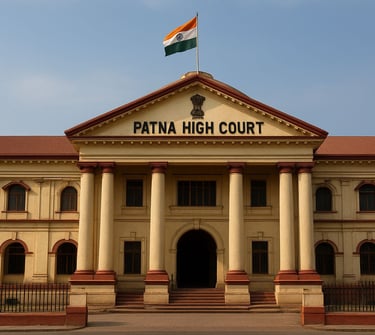Patna High Court Orders Congress to Remove AI-Generated Video of PM Modi’s Mother from Social Media
The Patna High Court has directed the Congress party to immediately delete an AI-generated video featuring Prime Minister Narendra Modi’s late mother from social media platforms. The order has ignited a wider debate on ethics, political campaigning, and the potential misuse of artificial intelligence in shaping public opinion.


By: Bharat Daily Samachar Date: 17 Sep,2025
Court Steps In Over AI Video Controversy
In a significant development, the Patna High Court has ordered the Congress party to take down an AI-generated video of Prime Minister Narendra Modi’s mother, which had been circulating across social media. The court observed that such content not only violates ethical boundaries but also risks inflaming public sentiment in the middle of a heated political climate.
This ruling has once again brought to the forefront the dangers of unchecked use of artificial intelligence in political discourse, where technology can be weaponized to manipulate emotions, spread misinformation, and attack personal lives.
What Sparked the Case
The controversy began when a video depicting PM Modi’s late mother surfaced on platforms like X, Facebook, and WhatsApp. Allegedly created using AI deepfake technology, the video was widely shared and appeared to portray political messaging aimed at influencing public opinion.
Multiple complaints were filed, arguing that such tactics cross the line of decency by dragging family members—particularly those no longer alive—into political battles. Petitioners approached the Patna High Court, seeking intervention to prevent further circulation.
High Court’s Observations
During the hearing, the bench noted that while freedom of speech is a constitutional right, it cannot be stretched to justify content that violates dignity, morality, or basic human respect.
“Why should the image of a deceased family member be misused for political gains?” the court asked, directing the Congress party to ensure the immediate removal of the AI-generated video from all their official handles and affiliated pages. The order further emphasized that political debates must remain centered on policies, governance, and ideology—not on exploiting the personal lives of leaders.
Political Reactions
Unsurprisingly, the court’s directive triggered a wave of political reactions.
BJP leaders strongly welcomed the order, calling it a much-needed step against “dirty politics.” Party spokespersons argued that dragging Modi’s late mother into political crossfire reflected a “new low” in campaigning.
On the other hand, Congress officials maintained that the video was not officially sanctioned by the party leadership and may have been circulated by overzealous supporters. They stated that the party respects the dignity of family members of all leaders and will comply with the court’s directive.
Meanwhile, regional parties weighed in on the broader issue, warning that the rise of AI-generated propaganda could spiral out of control if not regulated.
The Larger Issue: AI and Deepfakes in Politics
Beyond partisan blame games, the controversy raises urgent concerns about the misuse of AI deepfake technology in Indian politics. Experts warn that such content is becoming increasingly realistic, making it harder for the average viewer to distinguish truth from fabrication.
Deepfakes have the potential to:
Distort elections by spreading fake speeches, images, or videos.
Damage reputations of leaders through manipulated content.
Erode public trust in legitimate media and communication channels.
Globally, governments are grappling with similar challenges. From the U.S. to Europe, debates are underway on how to regulate deepfake content without stifling innovation.
Ethics and Digital Responsibility
The Patna HC’s decision also touches on a moral question: Where should the line be drawn in political discourse? While criticism of policies and leadership is fundamental in democracy, targeting family members—especially deceased ones—crosses into dangerous territory.
Digital rights activists argue that all political parties must adopt strict internal guidelines for social media campaigns, ensuring AI tools are used responsibly. Failure to do so could lead to a wave of misleading, emotionally charged propaganda that undermines democratic values.
Role of Social Media Platforms
The incident has also put pressure on tech giants. Platforms like X, Facebook, and Instagram are being criticized for failing to detect and remove manipulated videos swiftly. While most platforms claim to have AI-based moderation tools, the sheer volume of uploads makes real-time detection difficult.
Analysts suggest that closer coordination between regulators, courts, and social media platforms will be essential to curb misuse. Some are even calling for legal penalties against platforms that fail to act on deepfake complaints in time.
Public Reactions
Public opinion on the issue has been sharply divided. Many citizens condemned the video as an invasion of privacy and an insult to cultural values of respect for parents and elders. On the other hand, some users argued that political leaders, given their public stature, inevitably become targets of aggressive campaigning.
However, a majority agreed on one point: using the likeness of a deceased person for political gain is unacceptable.
Conclusion: A Wake-Up Call for Indian Politics
The Patna High Court’s order marks an important precedent in India’s digital landscape. It underscores the urgent need for ethical boundaries in political campaigning and highlights the dangers posed by unregulated use of AI.
For the Congress, the ruling is a reminder of how quickly campaign tools can backfire. For the BJP, it is a vindication of their demand for respect and dignity in political rivalries. For citizens, it is a wake-up call about the growing challenge of identifying truth in the digital era.
As India heads into a future where artificial intelligence will play a bigger role in shaping narratives, the incident stands as a warning: technology must serve democracy, not undermine it.
